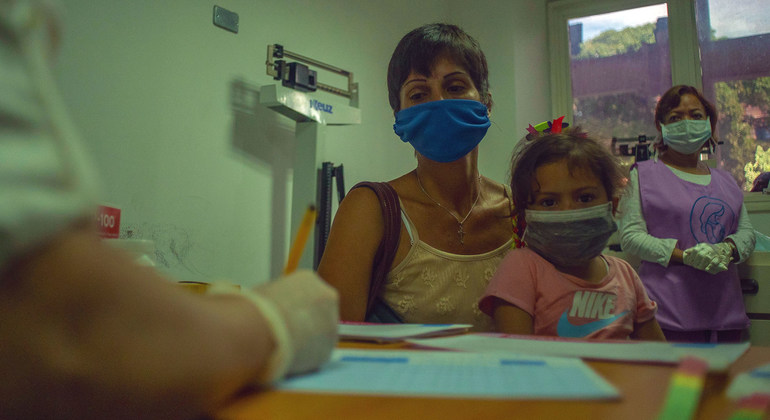There are some signs of progress however: in 2020, countries surveyed reported that, on average, about half of essential health services were disrupted. In the first 3 months of 2021, that figure had dropped to just over one third of services.
Overcoming disruptions
Many countries have now stepped up efforts to mitigate disruptions. These include informing the public about changes to service delivery and providing advice about ways to safely seek healthcare. They are identifying and prioritizing patients with the most urgent needs.
More than half the countries say they have recruited additional staff to boost the health workforce; redirected patients to other care facilities; and switched to alternative methods to delivering care, such as providing more home-based services, multi-month prescriptions for treatments, and increasing the use of telemedicine.
WHO and its partners have also been helping countries to better respond to the challenges being placed on their health systems; strengthen primary healthcare, and advance universal health coverage.
“It is encouraging to see that countries are beginning to build back their essential health services, but much remains to be done”, said Tedros Adhanom Ghebreyesus, Director General of WHO.
“The survey highlights the need to intensify efforts and take additional steps to close gaps and strengthen services. It will be especially important to monitor the situation in countries that were struggling to provide health services before the pandemic.”
Conditions persist
Countries are still having to make important decisions when responding to COVID-19, that may negatively affect access to care for other health issues.
Redeployment of staff to provide COVID-19 relief and temporary closures of health facilities and services continue, the UN health agency said.
Although they may have taken on new staff, 66% of countries continue to report health workforce-related reasons as the most common causes of service disruptions.
Supply chains are also still disrupted in nearly one third of countries, affecting the availability of essential medicines, diagnostics, and the PPE needed to safely and effectively provide care.
More than half of countries report service disruptions due to patients not seeking care and because of mistrust and fears of becoming infected.
Meanwhile, 43% of countries, cite financial challenges as major causes for disruptions.
Impacts
Millions of people are still missing out on vital healthcare, the WHO data shows. Nearly half of countries reported that the most affected area was the provision of day-to-day primary care to prevent and manage some of the most common health problems.
Long term care for chronic conditions, rehabilitation, and palliative end-of-life care, is also still badly disrupted. 20% of countries says potentially life-saving emergency, critical and surgical care interventions are still disrupted and two thirds of countries also report disruptions in elective surgeries.
Among the most extensively affected health services are mental, neurological and substance use disorders; neglected tropical diseases; tuberculosis; HIV and hepatitis B and C; cancer screening, and services for other noncommunicable diseases including hypertension and diabetes; family planning and contraception; urgent dental care; and malnutrition.
More than one third of countries are still reporting disruptions to immunisation services, despite 20% and 30% less disruption compared to 2020.
“We cannot allow today’s fight against COVID-19 to undermine our fight against measles, polio or other vaccine preventable illnesses. Prolonged immunization disruptions will have long-term consequences for children’s health. The time to catch up is now,” said Henrietta Fore, UNICEF Executive Director.
40% of countries are also reporting disruptions to one or more malaria services. While 10% fewer countries reported disruptions to malaria diagnosis and treatment compared to 2020 and 25-33% fewer countries reporting disruptions to malaria prevention campaigns, the level of disruption is still significant and needs to be urgently addressed, said WHO in a statement.
WHO support
The agency said it will continue to support countries so they can respond to increased strains on health systems.
This includes supporting mechanisms to speed up equitable access to COVID-19 vaccines, tests and treatments, and the Strategic Preparedness and Response Plan, which guides actions taken at national, regional, and global levels to tackle COVID-19.
The organisation is also focused on delivering the work it committed to before the pandemic. Through the “Boost initiative” which covers 115 countries, it has strengthened its capacity to provide additional support, so countries can maintain essential health services during the pandemic, and advance progress towards universal health coverage.




